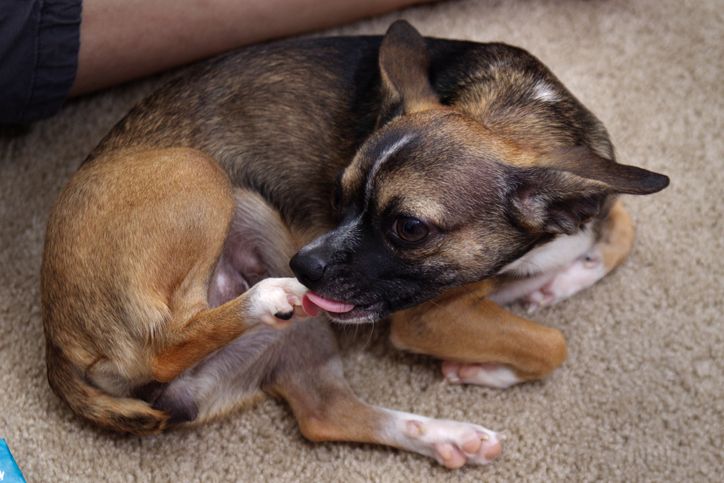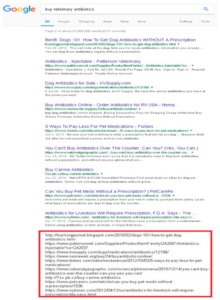Dogs often chew on their feet due to allergies, boredom, or anxiety. Skin infections and parasites can also trigger this behavior. So let read out: What Causes Dogs to Chew on Their Feet?
Chewing on their feet can be a common issue for dogs, raising concerns for pet owners. This behavior may indicate underlying health problems or emotional distress. Dogs may chew to relieve itching, discomfort, or stress, making it crucial for owners to identify the root cause.
Allergies to food, pollen, or chemicals often lead to irritated skin, prompting excessive licking and chewing. Boredom or anxiety can also play significant roles, as dogs seek to alleviate their stress. Understanding the reasons behind this behavior is essential for ensuring your dog’s health and well-being. Addressing these issues promptly can lead to a happier, healthier pet.

Credit: prideandgroom.com
Table of Contents
Canine Foot Chewing: More Than A Quirk
Many dog owners notice their pets chewing on their feet. This behavior often seems odd but can have deeper meanings. Understanding why dogs chew on their feet helps in addressing the issue effectively.
The Basics Of Dog Behavior
Dogs communicate through actions. Chewing their feet can signal various things:
- Allergies: Food or environmental allergens can irritate paws.
- Anxiety: Stress can lead to compulsive behaviors.
- Infections: Bacterial or fungal infections may cause discomfort.
- Injury: Cuts or scrapes might lead to licking and chewing.
Identifying The Habit
Recognizing the type of chewing is crucial. Observe your dog closely. Here are some key points:
- Check for redness or swelling on the paws.
- Look for signs of itching or pain.
- Monitor the frequency of chewing.
- Note any changes in behavior or appetite.
If chewing becomes excessive, consult a vet. Early intervention can prevent further issues. Your dog’s paws deserve care and attention.
Allergies And Itchiness: A Common Culprit
Dogs often chew their feet due to allergies. Itchiness drives them to seek relief. Understanding different allergies helps in finding solutions.
Types Of Allergies In Dogs
Allergies in dogs can stem from various sources. Here are the main types:
- Food Allergies: Ingredients like chicken, beef, or grains.
- Environmental Allergies: Pollen, dust mites, or mold.
- Flea Allergies: Reactions to flea saliva.
- Contact Allergies: Reactions to substances like chemicals or fabrics.
Symptoms To Watch For
Recognizing symptoms early is crucial. Here are signs of allergies:
| Symptom | Description |
|---|---|
| Itching | Persistent scratching or licking. |
| Redness | Inflamed skin or paws. |
| Swelling | Swollen paws or areas of the skin. |
| Hair Loss | Bald patches from excessive chewing. |
| Ear Infections | Frequent shaking of the head. |
Watch for these signs. Early intervention helps prevent further discomfort.
Parasites: Unwanted Guests
Dogs often chew on their feet due to pesky parasites. These unwelcome guests can cause irritation and discomfort. Understanding these parasites helps in providing proper care.
Fleas And Ticks
Fleas and ticks are common parasites. They can cause intense itching. This discomfort leads dogs to chew on their feet.
- Fleas: Small, jumping insects that feed on blood.
- Ticks: Arachnids that attach to the skin and suck blood.
Signs of fleas and ticks include:
- Excessive scratching.
- Hair loss in patches.
- Red, irritated skin.
Regular flea and tick prevention is essential. Consult your vet for suitable treatments.
Mites And Other Invaders
Mites are tiny creatures that can cause serious issues. They can lead to conditions like mange. Dogs will chew their feet to relieve the discomfort.
- Demodectic Mites: Common in younger dogs. They cause localized hair loss.
- Sarcoptic Mites: Highly contagious. They cause intense itching and skin infections.
Other invaders include:
- Worms.
- Fungal infections.
Keep an eye out for symptoms. Early treatment can prevent further issues.

Credit: www.whole-dog-journal.com
Pain And Discomfort: Hidden Ailments
Dogs often chew on their feet due to hidden pain and discomfort. This behavior can signal underlying health issues. Understanding the causes helps in providing the right care.
Joint Pain And Arthritis
Joint pain can make dogs feel uncomfortable. Arthritis is a common issue in older dogs. Signs include:
- Difficulty getting up
- Stiffness after resting
- Reduced activity levels
Dogs may lick their feet to soothe their pain. The act of chewing can provide temporary relief. Regular vet check-ups are essential for early detection.
Injuries Leading To Licking
Injuries often lead to excessive licking. Cuts, scrapes, or foreign objects can cause pain. Watch for these signs:
- Swelling around the paw
- Bleeding or redness
- Reluctance to walk
Inspect the paws regularly. Look for hidden injuries. Prompt treatment can prevent further issues.
Psychological Factors: Stress And Anxiety
Dogs often chew on their feet due to psychological factors. Stress and anxiety play significant roles in this behavior. Understanding these causes can help in managing it effectively. Below are two main psychological reasons why dogs may chew on their paws.
Separation Anxiety
Separation anxiety occurs when dogs feel distressed when left alone. This condition can lead to various behaviors, including foot chewing. Signs of separation anxiety include:
- Excessive barking or whining
- Destructive behavior
- House soiling
- Pacing or restlessness
When dogs chew their feet, they may find temporary relief. This behavior serves as a coping mechanism. Owners can help by:
- Gradually increasing alone time.
- Providing engaging toys.
- Creating a safe space.
Boredom And Lack Of Stimulation
Boredom is another common cause of foot chewing. Dogs need mental and physical stimulation. Without it, they may resort to chewing. Here are some signs of boredom:
- Excessive yawning
- Chewing furniture or shoes
- Following you everywhere
To combat boredom, try the following:
- Increase daily exercise.
- Introduce puzzle toys.
- Engage in training sessions.
Providing variety keeps dogs mentally stimulated. This can reduce foot chewing behavior significantly.
Skin Conditions: Dermatological Issues
Many dogs chew on their feet due to skin conditions. These issues can cause discomfort and itchiness. Understanding these conditions helps in addressing the problem effectively.
Yeast Infections
Yeast infections are common in dogs. They can cause intense itching and irritation. Dogs often chew their paws to relieve this discomfort.
- Symptoms of yeast infections include:
- Red, inflamed skin
- Foul odor
- Excessive licking and chewing
- Hair loss around the affected area
Yeast thrives in warm, moist areas. Paws are a prime spot for these infections. Regular cleaning can help prevent this issue.
Hot Spots And Dermatitis
Hot spots are another reason dogs chew their feet. These are areas of inflamed skin. They can develop quickly and cause great discomfort.
| Condition | Causes | Symptoms |
|---|---|---|
| Hot Spots | Allergies, parasites, moisture | Red, swollen patches, oozing |
| Dermatitis | Contact irritants, allergies | Itching, redness, scabbing |
Dermatitis can be caused by many factors. Allergies and irritants are common culprits. A vet can diagnose the specific type.
- Signs of hot spots and dermatitis include:
- Intense itching
- Scabs and sores
- Excessive licking
Prompt treatment is vital. Left untreated, these conditions can worsen. Keeping your dog comfortable is essential.
Grooming And Care: Maintaining Paw Health
Keeping your dog’s paws healthy is essential. Proper grooming and care prevent issues like chewing. Regular maintenance helps avoid discomfort and irritation.
Nail Trimming And Paw Care
Nail trimming is vital for your dog’s paw health. Long nails can cause pain and lead to chewing. Follow these steps for effective nail care:
- Use sharp, pet-safe nail clippers.
- Trim a little at a time.
- Avoid cutting the quick, which is sensitive.
- Reward your dog after each trim.
Check your dog’s paws regularly. Look for dirt, debris, or injuries. Clean their paws after walks to prevent infections.
Proper Bathing Techniques
Bathing your dog helps maintain clean paws. Use gentle, dog-friendly shampoo. Follow these bathing tips:
- Brush your dog before bathing.
- Wet your dog thoroughly with lukewarm water.
- Apply shampoo and lather gently.
- Rinse completely to remove all soap.
- Dry your dog with a towel, focusing on the paws.
Pay special attention to the paws during baths. This helps remove dirt and allergens. Clean paws reduce the urge to chew.
When To Seek Veterinary Help
Not all chewing is normal. Sometimes, chewing indicates a serious issue. Understanding when to seek help can save your dog’s health.
Recognizing A Serious Problem
Watch for these signs of a serious problem:
- Persistent Chewing: Chewing that lasts for days.
- Red or Swollen Feet: Signs of irritation or infection.
- Bleeding: Open wounds from chewing.
- Foul Odor: Unpleasant smell from paws.
- Behavior Changes: Increased anxiety or aggression.
Each sign can indicate a different issue. Don’t ignore these symptoms. Early action can prevent serious complications.
Treatment Options And Prevention
Veterinarians offer various treatments based on the cause:
| Cause | Treatment |
|---|---|
| Allergies | Antihistamines, dietary changes |
| Infections | Antibiotics, topical treatments |
| Parasites | Flea and tick medications |
| Behavioral Issues | Training, anxiety relief medications |
Preventive measures can help:
- Regular Vet Checkups: Catch problems early.
- Proper Grooming: Keep paws clean and healthy.
- Balanced Diet: Ensure nutritional needs are met.
- Exercise: Keep your dog active and engaged.
Taking these steps can reduce the risk of chewing issues. A healthy dog is a happy dog.

Credit: www.rover.com
Frequently Asked Questions
What Are Common Reasons For Dogs Chewing Their Feet?
Dogs often chew their feet due to allergies, infections, or irritation. Environmental allergens like pollen or dust can trigger this behavior. Other reasons include boredom, anxiety, or even skin conditions. Regular vet check-ups can help identify and treat the underlying cause effectively.
How Can I Stop My Dog From Chewing Its Feet?
To stop your dog from chewing its feet, first, identify the cause. Consult a veterinarian for proper diagnosis and treatment. You can also provide mental stimulation through toys and regular exercise. Additionally, use deterrent sprays to discourage chewing while addressing the root problem.
Are Allergies A Cause Of Foot Chewing In Dogs?
Yes, allergies are a common cause of foot chewing in dogs. They can be triggered by food, pollen, or flea bites. Symptoms often include itching, redness, and inflammation. A veterinarian can recommend allergy testing and treatment options to alleviate your dog’s discomfort.
When Should I See A Vet For Foot Chewing?
You should see a vet if your dog’s foot chewing is persistent or severe. Signs that require immediate attention include swelling, bleeding, or foul odor. Also, if your dog seems distressed or in pain, it’s crucial to consult a professional.
Early diagnosis can prevent further issues.
Conclusion
Understanding why dogs chew on their feet is essential for pet owners. This behavior can stem from allergies, boredom, or anxiety. Identifying the cause is crucial for effective treatment. Regular vet check-ups and engaging activities can help alleviate this issue.
A happy, healthy dog is less likely to chew on its paws.



